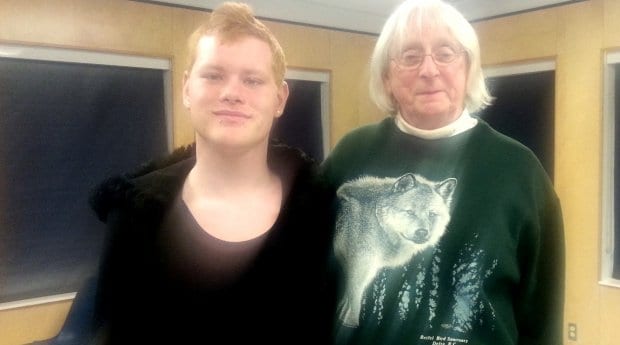Spellbound, the audience absorbs Bridget Coll and Chris Morrissey’s story, as the couple recounts the devastating effects of dementia on their 37-year relationship.
“Why can’t she remember to turn off the lights, turn off the faucet, close the fridge door?” Morrissey asks in a video presentation, as she recalls the first worrying signs of dementia, the doctor’s initial dismissal as “minor memory loss,” and the steady descent of her partner into an abyss of confusion.
“Then I remember,” Morrissey says, “it’s not her; it’s her disease.”
Coll and Morrissey’s video was one of 15 acts presented Feb 22 at an intergenerational project bringing together older and younger queer people to share stories.
The event marked the culmination of six months of writing and story exchanges between youth aged 13 to 22 from Surrey’s Youth for A Change group, and elders aged 55 to 86 from Vancouver’s Queer Imaging & Riting Kollective for Elders (Quirk-e).
To Quirk-e co-leader Claire Robson, the two groups have a lot in common. “They are getting out there and challenging and changing stereotypical assumptions,” she says. “Their stories about feminism, being queer, transgendered, asexual are similar and different at the same time.”
Through spoken word and video presentations, participants shared stories of defiance, of refusing to be silenced, of the destructive impact of homophobia, and a satirical take on the “queer agenda.”
In his video presentation, 15-year-old Tyler Cogwell-Shears told the audience of 60 people at the Britannia Services Centre that he’s known he was a boy since he was five years old. “I was clinically depressed at the age of eight,” he added.
“People see only your outside and they mistakenly believe that your outside is who you are,” said Gayle Roberts, 74, in a letter to her eight-year-old self, Michael. “They have not yet learned to see inside you. When they have learned to do that, they will see the real you — a girl — deep within trying to be free. Be proud of that person inside you, let her grow and discover for herself who she is… There may be times when you will find it very painful, but always remember that your discoveries make you free. To be happy you must discover who you are, but that is not enough, you must also create the person you will become.”
Social activist and former Vancouver city councillor Ellen Woodsworth offered an inspiring story of feminist lesbians in the early 1970s, who insisted on being visible. Woodsworth said she came out in 1971 and was “shocked that women who were sisters [in the feminist movement] did not accept us.”
The defiance of Woodsworth and others in Toronto led to Canada’s first gay women’s conference in 1973.
Audience members were also moved by the story of “Jean, the Boygirl,” found dead under the Burrard Street Bridge in 1976. As told by Quirk-e member Marsha Ablowitz, the police concluded that Jean had jumped to her death. Even after being told that Jean had been repeatedly harassed on that same bridge while walking home at night, the police felt there was “no need to waste time because they knew what happened,” one officer allegedly told Ablowitz. “There is evidence that she was, you know, a homo . . . a boy/girl.”
Members of both groups came together to close the evening with a fun, tongue-in-cheek performance of the “I Am the Queer Agenda,” written by Youth for A Change member Syd Oremak, who began with, “I am the thing the middle-aged white man fears.”

 Why you can trust Xtra
Why you can trust Xtra


